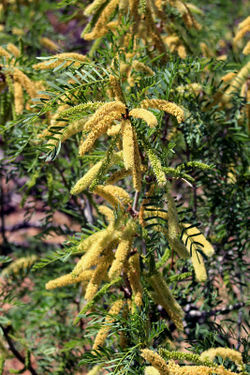Mesquite
Other Names : honey mesquite, western honey mesquite, prairie mesquite, glandular mesquite (Prosopis glandulosa); velvet mesquite (Prosopis velutina); screwbean mesquite, tornillo (Prosopis pubescens)
Special Precautions of Mesquite
Mesquite is not known to be highly toxic. However, there are parts of the plant that can have adverse effects. When eaten, the seeds can cause digestive problems (Tull, 1999). Though the spines aren’t necessarily poisonous, they may cause soreness (“Honey Mesquite”). The flowers are allergenic and the pollen can cause hay fever (Tull, 1999). The gum may also cause irritation (Kay, 1996).
Health Benefits and Uses of Mesquite
The medicinal properties of mesquite have long been known and utilized by many native tribes throughout the southwest United States and northern Mexico such as the Pima, Seri, Papapago, Paipai, Paiute, Tewa, Mayo, Yaqui and others. Mesquite is commonly used to treat eye conditions, open wounds and dermatological ailments. Acting much as an antacid it can also treat digestive problems (Davidow 1999). Mesquite has antibiotic activity and its aqueous extracts are antibacterial (Kay, 1996). It has soothing, astringent, and antiseptic properties (Davidow 1999).
- Branches, stems, bark: The branches, stems and inner yellow bark can be used as purgatives. The stems can be used to treat fever. Mesquite bark can also be used for bladder infection, measles or fever.
- Pods: Mesquite pods are used to make eyewashes. Sunburn can be treated with a decoction of the beans. The pods can be prepared as a poultice that is applied to a sore throat or a as a drink that is taken for animal stings.
- Gum: The part most used for medicinal purposes is probably the gum exuded from the trunk. It can be used as an eyewash that can be used to treat infection and irritation. Its several dermatological uses include treatment for sores, wounds, burns, chapped fingers and lips and sunburn. Also good for stomach ailments it can be taken for diarrhea, stomach inflammation, system cleansing or to settle the intestines. Other uses for mesquite gum include treatment for lice, sore throat, cough, laryngitis, fever reduction, painful gums, hemorrhoids and it can be used as a purgative.
- Leaves: The leaves also make good eyewashes that can be used to treat pink eye. Intestinal problems that the leaves can be used for are diarrhea and empacho. They can also be prepared to treat headaches, painful gums and bladder infection. A poultice of leaves is used for red ant stings. Leaves can serve as an emetic or system cleanser.
- Source of Oleanolic Acid
